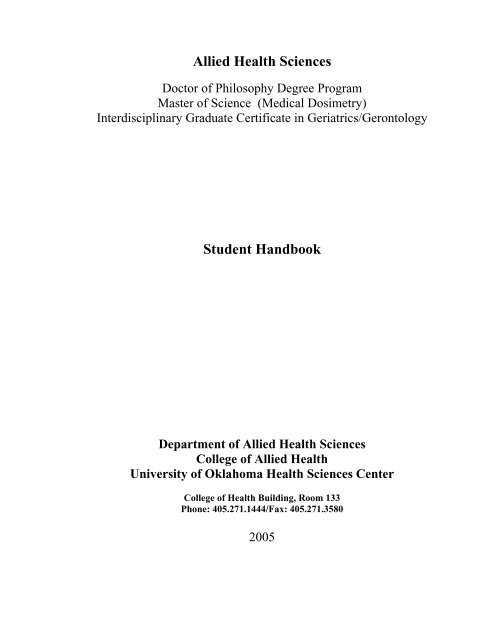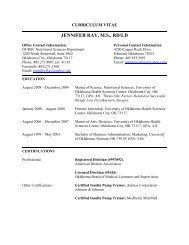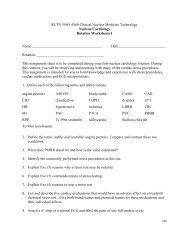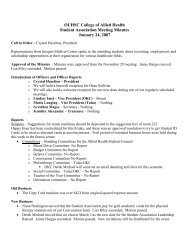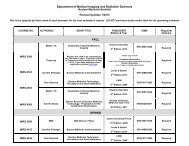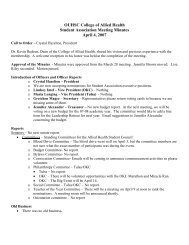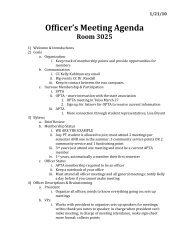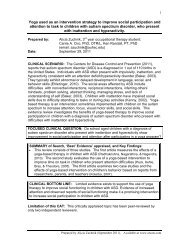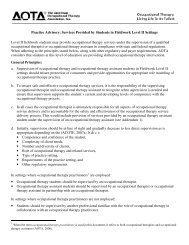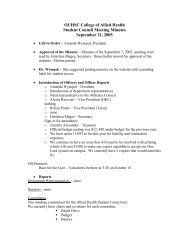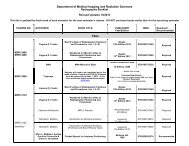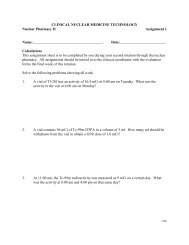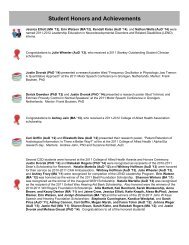Allied Health Sciences - College of Allied Health - University of ...
Allied Health Sciences - College of Allied Health - University of ...
Allied Health Sciences - College of Allied Health - University of ...
You also want an ePaper? Increase the reach of your titles
YUMPU automatically turns print PDFs into web optimized ePapers that Google loves.
<strong>Allied</strong> <strong>Health</strong> <strong>Sciences</strong>Doctor <strong>of</strong> Philosophy Degree ProgramMaster <strong>of</strong> Science (Medical Dosimetry)Interdisciplinary Graduate Certificate in Geriatrics/GerontologyStudent HandbookDepartment <strong>of</strong> <strong>Allied</strong> <strong>Health</strong> <strong>Sciences</strong><strong>College</strong> <strong>of</strong> <strong>Allied</strong> <strong>Health</strong><strong>University</strong> <strong>of</strong> Oklahoma <strong>Health</strong> <strong>Sciences</strong> Center<strong>College</strong> <strong>of</strong> <strong>Health</strong> Building, Room 133Phone: 405.271.1444/Fax: 405.271.35802005
Table <strong>of</strong> ContentsProgram Descriptions...........................................................................................................................3Resources for Policies and Procedures ................................................................................................3Annual Student Review Procedure ......................................................................................................3Degree Credit Hours RequirementsDoctor <strong>of</strong> Philosophy .................................................................................................................4Master <strong>of</strong> Science, Medical Dosimetry......................................................................................4Interdisciplinary Graduate Certificate, Geriatrics/Gerontology ................................................4Program Specific InformationDoctor <strong>of</strong> Philosophy .................................................................................................................5Master <strong>of</strong> Science, Medical Dosimetry......................................................................................7Interdisciplinary Graduate Certificate, Geriatrics/Gerontology ................................................8Appendix..............................................................................................................................................9ChecklistsDoctor <strong>of</strong> Philosophy ...............................................................................................................10Master <strong>of</strong> Science, Medical Dosimetry....................................................................................11Interdisciplinary Graduate Certificate in Geriatrics/Gerontology ...........................................12Student Advisement FormDoctor <strong>of</strong> Philosophy ...............................................................................................................13Master <strong>of</strong> Science, Medical Dosimetry....................................................................................15Interdisciplinary Graduate Certificate in Geriatrics/Gerontology ...........................................16Guidelines ..........................................................................................................................................17Appendix to General Examination Guidelines ........................................................................21Information and Resources ................................................................................................................23Every effort is made to provide information that is accurate at the time the handbook is prepared. However,information is subject to change at any time during the period for which the handbook is in effect. The <strong>University</strong> <strong>of</strong>Oklahoma <strong>College</strong> <strong>of</strong> <strong>Allied</strong> <strong>Health</strong> Department <strong>of</strong> <strong>Allied</strong> <strong>Health</strong> <strong>Sciences</strong> reserves the right at all times todiscontinue, modify or otherwise change its policies when it determines it is in the best interest <strong>of</strong> the departmentand program to do so.Equal Opportunity Institution: This institution, in compliance with all applicable Federal and State laws andregulations, does not discriminate on the basis <strong>of</strong> race, color, national origin, sex, age, religion, disability, or status asa veteran in any <strong>of</strong> its policies, practices, or procedures. This includes but is not limited to admissions, employment,financial aid, and educational services.<strong>Allied</strong> <strong>Health</strong> <strong>Sciences</strong>2Student Handbook
Student Handbook<strong>Allied</strong> <strong>Health</strong> <strong>Sciences</strong>The Doctor <strong>of</strong> Philosophy degree program in <strong>Allied</strong> <strong>Health</strong> <strong>Sciences</strong> is interdisciplinary and designedto promote expansion <strong>of</strong> knowledge across disciplines and informed collaboration among disciplines.Graduates <strong>of</strong> this program will be prepared to assume leadership roles in research, education, publicpolicy, and administration <strong>of</strong> health care services.The Master <strong>of</strong> Science degree program has a specialization in Medical Dosimetry. The program isdesigned to provide registered radiation therapists with a B.A. or B.S. degree an opportunity foradvanced education, training and research and to become eligible to make application to the MedicalDosimetry Certification Board (MDCB).In response to trends in the demographics <strong>of</strong> a growing aging population and the anticipatededucational needs for pr<strong>of</strong>essionals to prepare for service to this population, the <strong>University</strong> <strong>of</strong>Oklahoma has created the Interdisciplinary Graduate Certificate in Geriatrics/GerontologyProgram. The program is intended for current students and pr<strong>of</strong>essionals in various disciplines whoare seeking to acquire basic knowledge and specialized skills needed for working with older adults. Aninterdisciplinary team model is the focus <strong>of</strong> this program.Resources for Policies and ProceduresIn addition to material contained in this handbook, each student should comply with policiesand procedures in the following:Graduate <strong>College</strong> Bulletinhttp://w3.ouhsc.edu/graduate/bulletin/index.htm<strong>College</strong> <strong>of</strong> <strong>Allied</strong> <strong>Health</strong> Student Handbookhttp://www.ah.ouhsc.edu/main/studenthandbook%5Cfall03-04Handbook%5CBinder1.pdfOUHSC Student Handbook http://www.admissions.ouhsc.edu/books/STUHAND/default.htmOUHSC Faculty Handbook Section 4 Student Policies and Serviceshttp://ouhsc.edu/Provost/faculty_handbook/PDF/FacHandbookSec4.pdfGuidelines for the Preparation <strong>of</strong> the Masters Thesis and Doctoral Dissertationhttp://w3.ouhsc.edu/graduate/typinginst991.docAnnual Student Review ProcedureBy June <strong>of</strong> each year the student's adviser will conduct an annual review and evaluation <strong>of</strong> theirstudents' progress in meeting degree requirements and will notify the Chair <strong>of</strong> the Department<strong>of</strong> <strong>Allied</strong> <strong>Health</strong> <strong>Sciences</strong> <strong>of</strong> the results. The review may include, but is not limited to,considerations such as• Progress toward meeting conditions <strong>of</strong> admission;• Completion within the prescribed period <strong>of</strong> time <strong>of</strong> those courses in which the student hasreceived the grade <strong>of</strong> I;<strong>Allied</strong> <strong>Health</strong> <strong>Sciences</strong>3Student Handbook
• Completion <strong>of</strong> core course requirements;• Completion <strong>of</strong> research course requirements if applicable;• Progress toward completing research requirements if applicable;• Timely filing <strong>of</strong> the prospectus; the general quality <strong>of</strong> research; and• Completion <strong>of</strong> the thesis or dissertation if applicable.• Grade point averageThe review also may encompass the student's broader scholarly capabilities and pr<strong>of</strong>essionaldevelopment.The department will notify each student in writing <strong>of</strong> the student's progress and performancetoward satisfying degree requirements. If there are deficient areas, the department must specifyclearly what each student must do to receive a satisfactory evaluation and specify a time for asecond review. A copy <strong>of</strong> this letter will be sent to the Graduate Dean. The Graduate Dean willreview the student's total record and, if appropriate, the student will be placed on probation.Doctor <strong>of</strong> Philosophy, <strong>Allied</strong> <strong>Health</strong> <strong>Sciences</strong>Degree Credit Hour Requirements• All students are required to take core interdisciplinary (9 credit hours) and seminar courses(4 credit hours).• Students must participate in the seminar course each term.• There is a 12 credit hour requirement for research methods and statistic courses.• There are 12 required individualized credit hours in an area <strong>of</strong> specialization. Anindividualized program for each student will be identified to meet each student’s goals.Graduate courses from any <strong>of</strong> the departments within the <strong>College</strong> <strong>of</strong> <strong>Allied</strong> <strong>Health</strong>, the<strong>Health</strong> <strong>Sciences</strong> Center Campus or Norman Campus may be selected. Existing areas <strong>of</strong>specialization are Academic Leadership, Rehabilitation <strong>Sciences</strong> and Nutritional <strong>Sciences</strong>.• At least 20 credit hours are required in original research for the dissertation under thesupervision <strong>of</strong> faculty from the <strong>College</strong> <strong>of</strong> <strong>Allied</strong> <strong>Health</strong>.• Up to 44 credit hours may be transferred from the Masters degree based on the decision <strong>of</strong>the advisory committee.Master <strong>of</strong> Science, Medical Dosimetry• There is a 40 hour requirement for specialization• All students are required to take 2 credit hours <strong>of</strong> seminar• All students are required to take core allied health courses (16 credit hours).• Students must participate in 17 hours in individualized program• There is a 7 credit hour requirement for research and statistic courses.Interdisciplinary Graduate Certificate, Geriatrics/Gerontology• Students must complete 18 credit hours <strong>of</strong> graduate coursework which include:3 credit hours in Biology <strong>of</strong> Aging3 credit hours in Sociology <strong>of</strong> Aging3 credit hours <strong>of</strong> Psychology <strong>of</strong> Aging3 credit hours <strong>of</strong> Interdisciplinary Care<strong>Allied</strong> <strong>Health</strong> <strong>Sciences</strong>4Student Handbook
3 credit hours <strong>of</strong> Policy and Ethics, and3 credit hours <strong>of</strong> Geriatric Internship or an approved elective in an area <strong>of</strong> specialization.• A maximum <strong>of</strong> 25 percent <strong>of</strong> the minimum number <strong>of</strong> credit hours required for theCertificate may be transferred from other institutions. The coursework transferred mustrepresent valid graduate credit earned in graduate level courses from an accredited collegeor university. The credit must carry a grade <strong>of</strong> A, B, or S. The credit must be applicable tothe Certificate program. The transfer credit must not be more than six years old at the time<strong>of</strong> admission to the Certificate program.• Up to 18 credit hours <strong>of</strong> coursework completed for the Certificate may be applied towardthe Masters <strong>of</strong> Science in Geriatrics/Gerontology.Doctor <strong>of</strong> Philosophy Degree ProgramStudent AdvisorProgram Specific InformationThe student advisor is selected in the admission process with the responsibility to:o advise, encourage, and act as an advocate for the student from the first day a student isin the program;o design an appropriate curriculum for each student and work with the student to completeand submit the Report <strong>of</strong> the Doctoral Advisory Conference to the AHS AcademicAdvisory Committee for approval;o perform an annual evaluation <strong>of</strong> the student's progress toward the degree for submissionto the AHS Academic Advisory Committee;o chair the Examination Committee; ando help the student select an appropriate dissertation advisor.Student advisers shall meet regularly with their students to(a) assist students to develop and conduct their dissertation research,(b) advise students regarding the Seminar participation requirement and(c) counsel students about expectations for advancing inquiry about research topics from onepresentation to the next.Seminar RequirementSeminar will be <strong>of</strong>fered each Fall and Spring term, and all currently admitted students shallenroll in Seminar each term prior to candidacy. Four <strong>of</strong> the hours prior to candidacy will counttoward the 90 credit hours required in the program. During candidacy students shall participatein Seminar each term as a requirement for AHS 6980 Research for Doctoral Dissertation to helppromote satisfactory progress toward completion.All students should receive a seminar syllabus for each term.Seminar participation throughout a student’s plan <strong>of</strong> study is a core value <strong>of</strong> the department. Itprovides a forum for doctoral students and faculty to discuss together approaches to researchand scholarship and to advance student research interests.<strong>Allied</strong> <strong>Health</strong> <strong>Sciences</strong>5Student Handbook
Statistics and Research RequirementEach student will take at least 12 credit hours <strong>of</strong> statistics and research beyond the mastersdegree. Both quantitative and qualitative courses should be included. Additional hours may beneeded to provide a solid foundation for dissertation research and to attain knowledge for futureresearch. Students who completed a non-thesis masters degree will require additional statisticsand research coursework beyond the minimum 12 hours.Publication Requirement(Check with the department <strong>of</strong>fice or your advisor; requirement is in place for Fall 2005entering students.)Plan <strong>of</strong> StudyIn the first year <strong>of</strong> your program, you should complete the Report <strong>of</strong> the Doctoral AdvisoryConference http://w3.ouhsc.edu/graduate/docadvisory.htm with the approval <strong>of</strong> your adviserand submit the form to the <strong>Allied</strong> <strong>Health</strong> <strong>Sciences</strong> Department <strong>of</strong>fice (CHB 133).Student Examination CommitteeThe Student Examination Committee is established after the Report <strong>of</strong> the Doctoral AdvisoryConference is submitted and prior to the General Examination. The purpose <strong>of</strong> the committeeis too develop the General Examination and evaluation criteria; ando administer and evaluate the General Examination.The Chair <strong>of</strong> the Department <strong>of</strong> <strong>Allied</strong> <strong>Health</strong> <strong>Sciences</strong> selects the Examination Committeeafter meeting with the student and the student’s advisor to discuss their recommendations forthe Committee and forwards names to the Dean <strong>of</strong> the Graduate <strong>College</strong> for approval. Thecommittee consists <strong>of</strong> at least three members, the student’s advisor and two additional facultywho are members <strong>of</strong> the OUHSC graduate faculty. The chair <strong>of</strong> the Examination committeemust be a full member <strong>of</strong> the OUHSC graduate faculty.General ExaminationThe purpose <strong>of</strong> the general examination is to test students’ skills at being a consumer andproducer <strong>of</strong> knowledge in the field <strong>of</strong> study. Specifically the examination will evaluate thestudent's ability to synthesize, integrate, generalize, and expand upon all knowledge gainedprior to the examination including knowledge from the three general program areas: requiredcourses, specialization courses, and statistics and research methods. According to the Graduate<strong>College</strong> Bulletin, “students should expect that material included in this examination will gobeyond the subject matter covered in any individual course.”The General Examination consists <strong>of</strong> written and oral components. Each student’s ExaminationCommittee is responsible for developing the General Examination. The departmental GeneralExamination Guidelines are included in the appendix <strong>of</strong> this handbook. The student and thestudent’s Examination Committee Chair should consult the Graduate <strong>College</strong> Bulletin to ensure<strong>Allied</strong> <strong>Health</strong> <strong>Sciences</strong>6Student Handbook
compliance with all Graduate <strong>College</strong> requirements, including processes for the GeneralExamination.Student Doctoral CommitteeThe Doctoral Committee serves after the student successfully passes the general examinationand must be appointed by the time the student passes the general examination. Its purpose is too advise the student regarding selection <strong>of</strong> dissertation topic and research design andmethodology for the dissertation;o approve the student's research plan or prospectus;o advise and assist the student with specialty information necessary to design andcomplete the dissertation research project;o read and correct drafts <strong>of</strong> the dissertation to ensure that appropriate standards are met;ando administer the dissertation defense.Five faculty, at least three from the <strong>College</strong> <strong>of</strong> <strong>Allied</strong> <strong>Health</strong> and at least one from outside the<strong>College</strong>, serve on the Doctoral Committee. Three <strong>of</strong> the five committee members must holdgraduate faculty appointments with the ability to chair a dissertation committee. The student,jointly with his or her advisor, is responsible for the selection <strong>of</strong> the committee members.Names must be submitted for approval to Dean <strong>of</strong> the Graduate <strong>College</strong> through the Chair <strong>of</strong>the Department <strong>of</strong> <strong>Allied</strong> <strong>Health</strong> <strong>Sciences</strong>.Dissertation ResearchStudents will conduct original research under the guidance and supervision <strong>of</strong> program faculty.The doctoral dissertation is required. The 20 credits for the doctoral dissertation are based onthe full-time effort for one year including one summer.Dissertation Copy for Department OfficeEach graduate shall provide the Department <strong>of</strong> <strong>Allied</strong> <strong>Health</strong> <strong>Sciences</strong> a bound copy <strong>of</strong> thedissertation.Master <strong>of</strong> Science (Medical Dosimetry)Student AdvisorThe student advisor is selected in the admission process with the responsibility to:o advise, encourage, and act as an advocate for the student from the first day a student isin the program;o design an appropriate curriculum for each student and work with the student to completeand submit the Outline <strong>of</strong> Graduate Work to the Graduate <strong>College</strong>;o perform an annual evaluation <strong>of</strong> the student's progress toward the degree for submissionto the Graduate <strong>College</strong>;o chair the Comprehensive Examination Committee.<strong>Allied</strong> <strong>Health</strong> <strong>Sciences</strong>7Student Handbook
Student advisers shall meet regularly with their students to advise students on programrequirements and student progression.Seminar RequirementSeminar will be <strong>of</strong>fered as AHS 6990, Special Studies, fall and spring semesters, and allcurrently admitted students shall enroll in a total number <strong>of</strong> 2 hours.All students should receive a seminar syllabus for each term.Interdisciplinary Graduate Certificate in Geriatrics/GerontologyStudent AdvisorPlan <strong>of</strong> StudyThe student advisor is selected in the admission process with the responsibility to:o advise, encourage, and act as an advocate for the student from the first day a student isin the program;o design an appropriate plan <strong>of</strong> study for each student;o perform an annual evaluation <strong>of</strong> the student's progress toward the Certificate;Student advisers shall meet regularly with their students to(a) advise students regarding requirements and(b) counsel students about expectations for Certificate completion.An academic advisor from the student’s primary discipline may be selected to assist the StudentAdvisor and the student to advise and encourage the student and design an appropriate plan <strong>of</strong>study related to the student’s primary discipline.In the first year <strong>of</strong> their program, the student should meet with their adviser to design anappropriate plan <strong>of</strong> study related to the student’s primary discipline and academic goals. Alldecisions regarding electives or internships must receive written approval from the advisor andProgram Director. All forms and written documentation that is completed regarding thestudent’s Plan <strong>of</strong> Study must be submitted to the <strong>Allied</strong> <strong>Health</strong> <strong>Sciences</strong> Department <strong>of</strong>fice(CHB 133).Enrollment in CoursesThe Staff Assistant <strong>of</strong> the <strong>Allied</strong> <strong>Health</strong> <strong>Sciences</strong> Department <strong>of</strong>fice (CHB 133) will assiststudents to enroll in coursework for the Certificate Program. Students should contact the StaffAssistant in advance <strong>of</strong> each semester to enroll in courses and should also contact her towithdraw from courses.Admission for GraduationStudents should meet with their advisor in the first month <strong>of</strong> the final semester <strong>of</strong> theirCertificate coursework to initiate the process for graduation. The advisor and student must<strong>Allied</strong> <strong>Health</strong> <strong>Sciences</strong>8Student Handbook
Appendixnotify the Program Director and the <strong>Allied</strong> <strong>Health</strong> <strong>Sciences</strong> Department <strong>of</strong>fice (CHB 133) <strong>of</strong>the student’s intent to complete the Certificate program.Checklists:Doctoral DegreeMaster <strong>of</strong> Science (Medical Dosimetry)Certificate, Geriatric/Gerontology (working on Checklist with Graduate <strong>College</strong>)Student Advisement Form:Doctoral DegreeMaster <strong>of</strong> Science (Medical Dosimetry)Certificate, Geriatric/GerontologyGuidelines for General ExaminationDepartment <strong>of</strong> <strong>Allied</strong> <strong>Health</strong> <strong>Sciences</strong> Faculty and StaffInformation and Resources<strong>Allied</strong> <strong>Health</strong> <strong>Sciences</strong>9Student Handbook
<strong>College</strong> <strong>of</strong> <strong>Allied</strong> <strong>Health</strong>Department <strong>of</strong> <strong>Allied</strong> <strong>Health</strong> <strong>Sciences</strong>Doctor <strong>of</strong> Philosophy Degree ProgramChecklist for Doctoral Degree(The student should check the Graduate <strong>College</strong> Bulletin to confirm that this is the most currentchecklist. The student is responsible for complying with all Graduate <strong>College</strong> and Department <strong>of</strong><strong>Allied</strong> <strong>Health</strong> <strong>Sciences</strong> requirements and timelines.)No later than the end <strong>of</strong> the first year <strong>of</strong> graduate study, submit a Doctoral AdvisoryConference Report to the Graduate <strong>College</strong> through the Department <strong>of</strong> <strong>Allied</strong> <strong>Health</strong><strong>Sciences</strong>. Form is available at http://w3.ouhsc.edu/graduate/docadvisory.htm.When nearing completion <strong>of</strong> course work and research tools, file an Application for theGeneral Examination in the Graduate <strong>College</strong>. Provide copy to the Department <strong>of</strong> <strong>Allied</strong><strong>Health</strong> <strong>Sciences</strong>. The student must apply for the General Examination at least 2 weeks beforethe exam is held. The application form is available athttp://w3.ouhsc.edu/graduate/genexam.htm.Within one week after the General Examination is completed, a report signed by the entirecommittee must be submitted to the Graduate Dean. Provide copy to the Department <strong>of</strong><strong>Allied</strong> <strong>Health</strong> <strong>Sciences</strong>. The report indicates satisfactory or unsatisfactory performance. Thesignature form is provided to the committee by the Graduate <strong>College</strong>.Establish the Doctoral Committee no later than the time the General Examination issuccessfully completed.Enroll in a minimum <strong>of</strong> two credit hours <strong>of</strong> 6980 each semester following your initialenrollment. (consult the Continuous Enrollment Requirement Section <strong>of</strong> the GraduateBulletin for detailed information). Guidelines for preparation <strong>of</strong> the dissertation areavailable at http://w3.ouhsc.edu/graduate/typinginst991.doc.Prepare and distribute a reading copy <strong>of</strong> your dissertation to each committee member and theGraduate <strong>College</strong>. The reading copy deadlines are printed in the academic calendarhttp://www.ouhsc.edu/admissions/.Arrange with the members <strong>of</strong> the Doctoral Committee the date, hour, and place <strong>of</strong> the FinalOral Examination. Submit to the Graduate <strong>College</strong> and the Department <strong>of</strong> <strong>Allied</strong> <strong>Health</strong><strong>Sciences</strong> an announcement and an abstract.Within 72 hours after the defense, submit the report form with the results signed by allcommittee members to the Graduate <strong>College</strong>. Provide copy to the Department <strong>of</strong> <strong>Allied</strong><strong>Health</strong> <strong>Sciences</strong>. The signature form is provided to the committee by the Graduate <strong>College</strong>.Within 60 days after passing the dissertation defense, submit your dissertation to theGraduate <strong>College</strong>. Deadlines to graduate in a specific semester are listed in the GraduationDeadline section <strong>of</strong> the Bulletin. Provide copy <strong>of</strong> the dissertation to the Department <strong>of</strong><strong>Allied</strong> <strong>Health</strong> <strong>Sciences</strong>.<strong>Allied</strong> <strong>Health</strong> <strong>Sciences</strong>10Student Handbook
<strong>College</strong> <strong>of</strong> <strong>Allied</strong> <strong>Health</strong>Department <strong>of</strong> <strong>Allied</strong> <strong>Health</strong> <strong>Sciences</strong>Master <strong>of</strong> Science (Medical Dosimetry)Checklist for Masters Degree(The student should check the Graduate <strong>College</strong> Bulletin to confirm that this is the most currentchecklist. The student is responsible for complying with all Graduate <strong>College</strong> and Department <strong>of</strong><strong>Allied</strong> <strong>Health</strong> <strong>Sciences</strong> requirements and timelines.)Non-thesisNo later than the end <strong>of</strong> the first year <strong>of</strong> graduate study, submit an Outline <strong>of</strong> Graduate Workto the Graduate <strong>College</strong> through the Department <strong>of</strong> <strong>Allied</strong> <strong>Health</strong> <strong>Sciences</strong>.Select the members <strong>of</strong> your comprehensive examination committee or in conjunction withyour graduate liaison. All committee members must have a graduate faculty appointment.At the beginning <strong>of</strong> the semester in which you expect to graduate, file an Admission toCandidacy form for the master's degree in the Graduate <strong>College</strong> (consult the class schedule forspecific deadlines). Form may be found athttp://w3.ouhsc.edu/graduate/Forms/AdmCand_&_Grad_Work.pdf. Provide a copy to theDepartment <strong>of</strong> <strong>Allied</strong> <strong>Health</strong> <strong>Sciences</strong>.In consultation with the chair <strong>of</strong> your committee, a memorandum must be submitted to theGraduate <strong>College</strong> identifying a list <strong>of</strong> all committee members, the date <strong>of</strong> the examination anda request for the Authority Form. Provide a copy to the Department <strong>of</strong> <strong>Allied</strong> <strong>Health</strong><strong>Sciences</strong>.Within 72 hours after the comprehensive exam, submit the report form with the results signedby all committee members to the Graduate <strong>College</strong>. Provide a copy to the Department <strong>of</strong><strong>Allied</strong> <strong>Health</strong> <strong>Sciences</strong>.<strong>Allied</strong> <strong>Health</strong> <strong>Sciences</strong>11Student Handbook
<strong>College</strong> <strong>of</strong> <strong>Allied</strong> <strong>Health</strong>Department <strong>of</strong> <strong>Allied</strong> <strong>Health</strong> <strong>Sciences</strong>Interdisciplinary Graduate Certificate in Geriatrics/GerontologyChecklist for Certificate in Geriatrics/Gerontology(The student should check the <strong>College</strong> <strong>of</strong> <strong>Allied</strong> <strong>Health</strong> Bulletin to confirm that this is the most currentchecklist. The student is responsible for complying with all Department <strong>of</strong> <strong>Allied</strong> <strong>Health</strong> <strong>Sciences</strong>requirements and timelines.)In the first semester <strong>of</strong> coursework meet with your student advisor to agree uponan appropriate plan <strong>of</strong> study;Every spring semester meet with your student advisor to perform an annual evaluation<strong>of</strong> your progress toward the Certificate;At the beginning <strong>of</strong> the semester in which you expect to graduate, meet with youradvisor to initiate the process for graduation. Provide a copy <strong>of</strong> all relateddocumentation to the Department <strong>of</strong> <strong>Allied</strong> <strong>Health</strong> <strong>Sciences</strong>.<strong>Allied</strong> <strong>Health</strong> <strong>Sciences</strong>12Student Handbook
Student_____________________________Adviser________________________Student Advisement FormDepartment <strong>of</strong> <strong>Allied</strong> <strong>Health</strong> <strong>Sciences</strong>Ph.D. ProgramGraduate hours required for admission 34Post-baccalaureate hours for graduation 90RequirementSatisfiedCourses Term <strong>of</strong>fered Number <strong>of</strong> hoursrequiredMaximumnumber <strong>of</strong> hoursAHS 6113 Ethics Choices and Fall, even years 3 3ChallengesAHS 6133 Application <strong>of</strong> Spring, odd3 3Evidence Based Practice yearsAHS 6153 Teaching, Learning an Fall, even years3Technology (pending approval) (or demand)AHS 6173 Introduction to3Qualitative ResearchAHS 6193 Behavioral Approach t3LearningAHS 6233 Leadership in <strong>Allied</strong> Fall, odd years 3 3<strong>Health</strong> EducationAHS 6253 The Pr<strong>of</strong>essorate Spring, evenyears (or demand)3AHS 6272 Accreditation 2AHS 6333 Grant Writing in Spring, even3<strong>Health</strong> Pr<strong>of</strong>essionsyears (or demand)AHS 6950 Practicum in <strong>Allied</strong>6<strong>Health</strong> <strong>Sciences</strong>AHS 6960 Directed Readings 6AHS 6970 Seminar in <strong>Allied</strong> Each term 4 6<strong>Health</strong> <strong>Sciences</strong>*AHS 6980 Research for Doctoral20 30DissertationAHS 6990 Special Studies 6Credit hours from individualized p12(at least 6 credit hours in the<strong>College</strong> <strong>of</strong> <strong>Allied</strong> <strong>Health</strong>)Credit hours <strong>of</strong> research andstatistics (Both quantitative andqualitative courses should beincluded.). More may be12required depending on student’s mlevel work.*Four credit hours <strong>of</strong> enrollment are required, and students must enroll in seminar each term prior to candidacy. Participation in seminar during candidacystatus is required for satisfactory progress.<strong>Allied</strong> <strong>Health</strong> <strong>Sciences</strong>13Student Handbook
Transfer Credit for Doctoral Programs (from Graduate Bulletin 4.7.1)The acceptance <strong>of</strong> transfer credit from another institution for a doctoral degree at OUHSC is determined in accordancewith the following criteria:1. A maximum <strong>of</strong> 44 semester hours from individual courses and/or a completed degree may be applied toward adoctoral degree. Exceptions can be made for additional non-OU coursework taken by electronic media, followingenrollment in a OUHSC doctoral program.2. The coursework transferred must represent valid graduate credit earned in graduate level courses from an accreditedcollege or university.3. The credit must carry a grade <strong>of</strong> A, B, or S.4. The credit must be applicable to the degree program.5. Individual courses applied must not be more than six years old at the time <strong>of</strong> admission to the degree program. Inspecial cases, credit more than six years old may be transferred if recommended and validated by the department andapproved by the Graduate Dean. The departmental procedures to validate the student's current knowledge andcompetency must have the approval <strong>of</strong> the Graduate Dean.6. A completed master's degree, all <strong>of</strong> which is to be used, may be applied toward a doctoral degree regardless <strong>of</strong> age, ifapproved by the department/program and the Graduate Dean. The total number <strong>of</strong> credit hours transferred toward thePh.D. degree can not exceed 44 semester hours.7. Credit from a pr<strong>of</strong>essional degree program such as the M.D., D.D.S., or D.V.M. degree may be applied toward agraduate degree as transfer credit, provided that such courses carry a grade <strong>of</strong> A, B, or S and have been approved forgraduate credit by the academic institution <strong>of</strong> origin.8. Graduate coursework completed in doctoral granting departments at the <strong>University</strong> <strong>of</strong> Oklahoma Norman Campuswill be considered as residence credit, and upon approval <strong>of</strong> the department and the Graduate Dean, may be usedwithout limitation as credit toward a doctoral degree.9. Credit hours previously counted for one doctoral degree may not be applied toward a second doctoral degree. Nomore than six hours <strong>of</strong> transfer thesis research credit from a completed master's degree may be applied toward adoctoral degree.10. Credit by correspondence or by advanced standing examination will not apply toward a graduate degree.11. Graduate coursework taken in Tulsa from the <strong>University</strong> <strong>of</strong> Oklahoma is not considered transfer credit. OSU Tulsaconsists <strong>of</strong> five cooperating universities that provide undergraduate and graduate level courses as well as some degreeprograms. Credit taken from the other cooperating universities through OSU Tulsa is considered transfer work andmust comply with the transfer policies.12. All transfer coursework must be approved by the department and by the Graduate Dean. Departments with transferrules more stringent than those listed in this section have specified them in the departmental section <strong>of</strong> the bulletin.These more stringent rules take precedence over the general rules described in this section.Time Limits For Completing Doctoral Degree (Graduate Bulletin 4.7.3)A doctoral student who enters the OUHSC Graduate <strong>College</strong> with a bachelor's degree is expected to pass the departmentalgeneral examination within five calendar years <strong>of</strong> the student's first graduate enrollment in the department and a studentwho enters with a master's degree is expected to pass the departmental general examination within four calendar years <strong>of</strong>the student's first graduate enrollment in the department.A doctoral candidate is normally expected to complete all the degree requirements within five years after admission tocandidacy. Departments with shorter time limits have so indicated in the section <strong>of</strong> this Bulletin that refers specifically totheir program. Extensions greater than one year need the approval <strong>of</strong> the Graduate Dean and will require that thedepartment or program unit involved certify that the student's knowledge will be current and appropriate to the degree atthe time the degree is awarded. The procedure to be used for this determination must be approved by the Graduate Dean.Individual graduate courses, not applied toward a previous graduate degree, taken at the <strong>University</strong> <strong>of</strong> Oklahoma or atanother accredited university that is to be applied toward a doctoral degree must not be more than six years old at the time<strong>of</strong> admission or readmission to the Graduate <strong>College</strong>. No more than 23 credit hours (transfer credit and resident credit)applied toward a doctoral degree can be more than nine years old at the time <strong>of</strong> graduation for students entering with amaster's degree or ten years old for students entering with a bachelor's degree.<strong>Allied</strong> <strong>Health</strong> <strong>Sciences</strong>14Student Handbook
Student_____________________________Adviser________________________Student Advisement FormDepartment <strong>of</strong> <strong>Allied</strong> <strong>Health</strong> <strong>Sciences</strong>M.S., Medical DosimetryRegistered Radiation Therapists holding a B.A. or B.S. required for AdmissionPost-baccalaureate hours for graduation 40RequirementSatisfiedCourses Term <strong>of</strong>fered Number <strong>of</strong>hoursrequiredMaximum number<strong>of</strong> hoursSeminar 2 2BSE 5001, Statistical ComputerMethods Fall, Spring 1 1AHS 5113, <strong>Allied</strong> <strong>Health</strong>Standards and Practice Fall 3 3BSE 5113, Principles <strong>of</strong>EpidemiologyFall, Spring,Summer 3 3AHS 5122, Radiobiology andChemistry Fall 2 2AHS 5153, Foundations <strong>of</strong>Evidence Based Practice Fall 3 3BSE 5163, Biostatistics Methods IFall, SpringSummer 3 3AHS 5232, Principles <strong>of</strong>Medical Imaging & Pathophysiology Spring 2 2AHS 5263, Radiation Dosimetry ISpring 3 3AHS 5283, Radiation TherapyTreatment Planning Spring 3 3AHS 5483, Radiation Dosimetry IIFall 3 3AHS 5950, Practicum in <strong>Allied</strong><strong>Health</strong> <strong>Sciences</strong>AHS 6264, Radiological PhysicsEach term 8Fall 4 4<strong>Allied</strong> <strong>Health</strong> <strong>Sciences</strong>15Student Handbook
Student_____________________________Adviser________________________Baccalaureate hours required for admission 120Post-baccalaureate hours for graduation 18RequirementSatisfiedCoursesStudent Advisement FormDepartment <strong>of</strong> <strong>Allied</strong> <strong>Health</strong> <strong>Sciences</strong>Interdisciplinary Geriatric/Gerontology Certificate ProgramTerm <strong>of</strong>fered Number <strong>of</strong>hoursrequiredMaximumnumber <strong>of</strong>hoursSWK 5010 Social Gerontology Each Fall 3 3HSS 5863 Physiology <strong>of</strong> Aging or HPS 5383 <strong>Health</strong> andIllness in Old Age3 3HPS 5473 Psychology <strong>of</strong> AgingSummer,odd years 3 3AHS/NURS/OCA/PHSC 5973 InterdisciplinaryGeriatric care 3 3NURS 5053 Policy and Ethics in Nursing orEachSemesterAHS 6113 Ethics Choices and Challenges orAHS 5950 Geriatric InternshipFall, evenyears3 3Geriatric/GerontologyElective(s) – List below 3 3*Three credit hours <strong>of</strong> enrollment are required.Student SignatureDateAdvisor SignatureDateProgram Director SignatureDate<strong>Allied</strong> <strong>Health</strong> <strong>Sciences</strong>16Student Handbook
Doctor <strong>of</strong> Philosophy Degree ProgramGeneral Examination<strong>University</strong> <strong>of</strong> Oklahoma <strong>Health</strong> <strong>Sciences</strong> CenterDepartment <strong>of</strong> <strong>Allied</strong> <strong>Health</strong> <strong>Sciences</strong>GuidelinesIn the Department <strong>of</strong> <strong>Allied</strong> <strong>Health</strong> <strong>Sciences</strong>, the purpose <strong>of</strong> the general examination is to teststudents’ skills at being a consumer and producer <strong>of</strong> knowledge in the field <strong>of</strong> study. Specifically theexamination will evaluate the student's ability to synthesize, integrate, generalize, and expand upon allknowledge gained prior to the examination including knowledge from the three general programareas: required courses, specialization courses, and statistics and research methods. According to theGraduate <strong>College</strong> Bulletin, “students should expect that material included in this examination will gobeyond the subject matter covered in any individual course.”The General Examination consists <strong>of</strong> written and oral components. Each student’s ExaminationCommittee (see composition <strong>of</strong> Examination Committee) is responsible for developing the GeneralExamination, within the guidelines described below. The student and the student’s ExaminationCommittee Chair should consult the Graduate <strong>College</strong> Bulletin to ensure compliance with allGraduate <strong>College</strong> requirements, including processes for the General Examination.Composition <strong>of</strong> the Examination Committee:The Chair <strong>of</strong> the Department <strong>of</strong> <strong>Allied</strong> <strong>Health</strong> <strong>Sciences</strong> selects the Committee after meeting with thestudent and the student’s advisor to discuss their recommendations for the Committee and forwardsnames to the Dean <strong>of</strong> the Graduate <strong>College</strong> for approval. The committee consists <strong>of</strong> at least threemembers, the student’s advisor and two additional faculty who are members <strong>of</strong> the OUHSC graduatefaculty. The chair <strong>of</strong> the Examination committee must be a full member <strong>of</strong> the OUHSC graduatefaculty.General Guidelines1. Students apply for the General Examination when the coursework and any tools <strong>of</strong> researchare nearly complete. Only students in good academic standing are permitted to take theexamination. Students must be enrolled during the semester <strong>of</strong> the General Examination.2. The General Examination must consist <strong>of</strong> written and oral components. The oral componentis administered following successful completion <strong>of</strong> the written portion <strong>of</strong> the examination.3. Each student’s Examination Committee will administer and evaluate the General Examination.4. The Examination Committee will design an examination that measures the student's ability tosynthesize, interpret, and analyze knowledge gained throughout the course <strong>of</strong> study and willassess the student's ability to think critically, use evidence to support a position, andcommunicate complex ideas. The written examination will have three componentsa. A grant proposal to address a research question, developed by the ExaminationCommittee. (The format <strong>of</strong> the proposal should be the Presbyterian <strong>Health</strong><strong>Allied</strong> <strong>Health</strong> <strong>Sciences</strong>17Student Handbook
Foundation Seed Grant Guidelines and Application Forms unless the committeeidentifies a more appropriate agency grant request.)b. A paper, on a topic to be approved by the Examination Committee, <strong>of</strong> publishablequality (ready for submission) for a peer reviewed journal.c. A 6-hour examination comprised <strong>of</strong> a question designed to integrate program <strong>of</strong> studyinformation. (See Template in Appendix.)5. The student’s Examination Committee Chair will document the format/questions for theGeneral Examination and the criteria for determining if the student passes or fails the writtenand oral portions. A copy <strong>of</strong> the examination and evaluation criteria should be submitted tothe Chair <strong>of</strong> the Department <strong>of</strong> <strong>Allied</strong> <strong>Health</strong> <strong>Sciences</strong>.6. Together, the student and the Examination Committee will determine the timeline forcompletion <strong>of</strong> the written component <strong>of</strong> the examination.7. Two weeks before the written exam begins, the student will file an Application for the GeneralExamination in the Graduate <strong>College</strong> with a copy to the Department <strong>of</strong> <strong>Allied</strong> <strong>Health</strong><strong>Sciences</strong>.8. The Examination Committee will complete its evaluation <strong>of</strong> the written examination withintwo weeks. The decision that a student passes or fails the written examination is based on theopinion <strong>of</strong> the majority <strong>of</strong> the Examination Committee members.9. If a student fails the examination, she/he may petition to the Examination Committee to takethe examination the second time. A third attempt is not permitted. The student may take theoral examination only after passing the entire written exam.10. The oral examination should be scheduled within three weeks <strong>of</strong> the time the student passesthe written component.11. The student is responsible for scheduling the date, time, and location <strong>of</strong> the oral portion <strong>of</strong> theGeneral Examination with the Examination Committee and for informing the Department <strong>of</strong><strong>Allied</strong> <strong>Health</strong> <strong>Sciences</strong> two weeks before the oral component is held.12. Within one week after the oral examination is completed, a memorandum indicatingsatisfactory or unsatisfactory performance on the General Examination (written and oral) andsigned by the entire Examination Committee is submitted to the Graduate Dean through theChair <strong>of</strong> the Department <strong>of</strong> <strong>Allied</strong> <strong>Health</strong> <strong>Sciences</strong>.13. If the performance on the oral examination is determined to be unsatisfactory, the student’sExamination Committee will recommend either dismissal from the PhD program or onereexamination at a time that allows for appropriate preparation <strong>of</strong> the student in the areas <strong>of</strong>indicated weakness.14. The student’s Examination Committee Chair will give the student copies <strong>of</strong> the results <strong>of</strong> theevaluation <strong>of</strong> the General Examination and the memorandum to the Graduate Dean.<strong>Allied</strong> <strong>Health</strong> <strong>Sciences</strong>18Student Handbook
Oral Examination Guidelines1. The student’s Examination Committee will attend, administer, and evaluate the oralexamination.2. The oral examination will address areas that were not covered in the written portion <strong>of</strong> theexam and related areas and the student’s ability to self-assess performance on the writtenexamination. The oral exam also may require the student to provide rationale for content <strong>of</strong>the written work.3. The oral examination usually will last about 2 –3 hours.Grading the Written ExaminationAll members <strong>of</strong> the Examination Committee will read and grade each part <strong>of</strong> the written examination.The decision that a student passes or fails the written examination is based on the opinion <strong>of</strong> themajority <strong>of</strong> the Examination Committee members.Committee members will use the specific criteria established for each portion <strong>of</strong> the exam to assign agrade. The criteria for grading will be shared with the student. In general, students must receivegrades <strong>of</strong> excellent or good (A or B) to pass each part <strong>of</strong> the exam, and must pass each part to pass theoverall written examination. Students who fail one or more parts <strong>of</strong> the exam may petition to take theexamination a second time.The Examination Committee may use the following grading guidelines, adapted from the School <strong>of</strong>Management and Labor Relations at Rutgers <strong>University</strong>(http://www.rci.rutgers.edu/~smlr/PhD/Qualify.htm).<strong>Allied</strong> <strong>Health</strong> <strong>Sciences</strong>19Student Handbook
ExcellentGoodFailThe work is thorough, insightful, and scholarly; shows an excellentknowledge <strong>of</strong> the key issues, is well-written and appropriatelyreferenced, is definitely a “pass.”The work shows that the student is well-informed on the topic,but may lack some breadth or depth, or writing may need editing,nevertheless has shown a level <strong>of</strong> competence sufficient to “pass.”The work does not show an adequate understanding <strong>of</strong> the issuesand relevant literature, the work is poorly written; the quality <strong>of</strong>the grant is inadequate for funding; the quality <strong>of</strong> the specializationpaper is inadequate for publication. The student requires morestudy and/or time to substantially revise the work.Examination Committee members will grade each part <strong>of</strong> the written exam within two weeks <strong>of</strong>submission for grading, and will notify the Committee Chair. The Chair will compile the grades foreach part <strong>of</strong> the exam and consult with Committee members before assigning a grade <strong>of</strong> pass or failfor each part and for the overall examination. All Committee members shall participate in the gradingprocess and final result <strong>of</strong> the examination.Grading the Oral ExaminationAll members <strong>of</strong> the student’s Examination Committee will grade the oral examination according tospecific criteria developed by the Committee or may elect to use the following criteria. The studentmust receive grades <strong>of</strong> excellent or good (A or B) to pass the oral examination.ExcellentGoodFailThe student can provide good rationale for content <strong>of</strong> the writtenexamination and clearly is able to synthesize, integrate,generalize, and expand upon all knowledge gained prior to theexamination including knowledge from the three generalprogram areas: core courses, specialization, and statistics andresearch methods.The student is student is well-informed on the topics covered,but may lack some breadth or depth, and/or the student is able tosynthesize, integrate, generalize, and expand upon all knowledgegained prior to the examination, but not well in all programareas.The student provides inadequate or incorrect rationale forcontent <strong>of</strong> the written work and/or shows poor ability tosynthesize, integrate, generalize, and expand upon all knowledgegained prior to the examination work.Following completion <strong>of</strong> the oral examination, Examination Committee members will discuss thestudent’s performance. The decision that a student passes or fails the written examination is based onthe opinion <strong>of</strong> the majority <strong>of</strong> the Examination Committee members.<strong>Allied</strong> <strong>Health</strong> <strong>Sciences</strong>20Student Handbook
Appendix A: Evaluation CriteriaAPPENDIX TO GENERAL EXAMINATION GUIDELINESFaculty may use criteria for evaluating the grant from a number <strong>of</strong> funding sources, such as NationalInstitutes <strong>of</strong> <strong>Health</strong>, United States Department <strong>of</strong> Education, etc. The following criteria from the U.S.Department <strong>of</strong> Education is one example <strong>of</strong> criteria for evaluation <strong>of</strong> a research grant application.1. Significance (20 points)a. The significance <strong>of</strong> the problem or issue to be addressed by the proposed project, asdemonstrated thorough, high-quality review <strong>of</strong> the relevant literature,b. The potential contribution <strong>of</strong> the proposed project to increase knowledge orunderstanding <strong>of</strong> identified problems, issues, or effective strategies;c. The potential contribution <strong>of</strong> the proposed project to the development andadvancement <strong>of</strong> theory, knowledge, and practices in the field <strong>of</strong> study; andd. The extent to which the results <strong>of</strong> the proposed project are to be disseminated in waysthat will enable others to use the information or strategies.2. Quality <strong>of</strong> the project design (35 points)a. The extent to which there is a conceptual framework underlying the proposed researchand the quality <strong>of</strong> that framework;b. The extent to which the proposed research design a high-quality plan for researchactivities, and the use <strong>of</strong> appropriate theoretical and methodological tools; to includesolid support for all independent and dependent variables and, if appropriate, a poweranalysis to justify sample size; andc. The extent to which the methods include detailed and appropriate data analyses.3. Quality <strong>of</strong> project personnel (20 points)a. The qualifications, including relevant training and experience, <strong>of</strong> key projectpersonnel; andb. The qualifications, including relevant training and experience, <strong>of</strong> project consultants orsubcontractors.4. Quality <strong>of</strong> the management plan (15 points)a. The adequacy <strong>of</strong> the management plan to achieve the objectives <strong>of</strong> the proposedproject on time and within budget, including clearly defined responsibilities, timelines,and milestones for accomplishing project tasks;b. The adequacy <strong>of</strong> procedures for ensuring feedback and continuous improvement in theoperation <strong>of</strong> the proposed project; andc. The extent to which the time commitments <strong>of</strong> the project director and principalinvestigator and other key project personnel are appropriate and adequate to meet theobjectives <strong>of</strong> the proposed project.5. Adequacy <strong>of</strong> resources (10 points)a. The adequacy <strong>of</strong> support, including facilities, equipment, supplies, and other resources,from the applicant’s organization;b. The relevance and demonstrated commitment <strong>of</strong> each partner in the proposed project tothe implementation and success <strong>of</strong> the project;c. The extent to which the budget is adequate to support the proposed project; and<strong>Allied</strong> <strong>Health</strong> <strong>Sciences</strong>21Student Handbook
d. The extent to which the costs are reasonable in relation to the objectives, design, andpotential significance <strong>of</strong> the proposed projectAppendix B: Template/Guidelines (for writing question 4.c.)This part <strong>of</strong> the written examination is intended to assess the student’s ability to engage in and displayoriginal thinking, and to integrate ideas in a coherent and critical manner. The question/s, will bebroad enough to:1. allow synthesis <strong>of</strong> information from at least three courses in the program <strong>of</strong> study andother areas;2. challenge the student to use multiple sources <strong>of</strong> information and present a comprehensiveresponse;3. require the student to reference key authors, experts or major work in the field.4. require the student to demonstrate his/her ability to think through a problem and plan byoutlining the response to the question.In writing the question, the Examination Committee may choose to develop questions that emphasizeone or more <strong>of</strong> the following elements:o Reconciling two or more opposing views in the field.o Applying new methods to existing methods or models.o Developing new or advanced theoretical or practical models.o Developing methods or programs to address new or changing problems and projectingoutcomes.o Proposing arguments that can be used to advance a new approach or way <strong>of</strong> thinking.<strong>Allied</strong> <strong>Health</strong> <strong>Sciences</strong>22Student Handbook
Information and ResourcesDepartment <strong>of</strong> <strong>Allied</strong> <strong>Health</strong> <strong>Sciences</strong>Department Address:Department <strong>of</strong> <strong>Allied</strong> <strong>Health</strong> <strong>Sciences</strong>CHB-133, 801 Northeast 13 th Street<strong>College</strong> <strong>of</strong> <strong>Allied</strong> <strong>Health</strong>OUHSCP. O. Box 26901Oklahoma City, Oklahoma 73190Phone No: 405.271.1444Fax No: 405.271.3580Program Directors;Jan G. Womack, Ph.D. CHB-135 ext. 43403Chair, <strong>Allied</strong> <strong>Health</strong> <strong>Sciences</strong>jan-womack@ouhsc.eduDoctor <strong>of</strong> Philosophy Degree ProgramStacy Anderson, M.S., RT (T), CMD CHB-470 ext. 41169Program Directorstacy-anderson@ouhsc.eduMaster <strong>of</strong> Science in Medical DosimetrySandra Edge-Boyd, MSW, LCSW, LSW-Admin CHB-133A ext. 43400Program Directorsandra-edge-boyd@ouhsc.eduCertificate Program in Geriatrics/GerontologyAdministrative Staff:Vernice Browner CHB-133 ext. 43403Staff Assistantvernice-browner@ouhsc.eduStaff is available from 8:00 a.m. – 5 p.m. Monday through Friday. Staff desks, supplies and <strong>of</strong>fice equipment are forbusiness activities and are not available for student use. Contact the <strong>Allied</strong> <strong>Health</strong> <strong>Sciences</strong> Department <strong>of</strong>fice forquestions about resources for student use.<strong>Allied</strong> <strong>Health</strong> <strong>Sciences</strong>23Student Handbook
Books, Syllabi and ReadingsA list <strong>of</strong> required, recommended and supplemental references are included in each course syllabus.Some courses may also require readings that are in reference packets available for purchase or for useat the third floor reference desk <strong>of</strong> the Robert M. Bird <strong>Health</strong> <strong>Sciences</strong> Library in Oklahoma City andOUHSC-Tulsa Library in Tulsa. Instructors may place supplemental readings or handouts on thecourse WebCT bulletin board from which students may make copies. Instructors may use electronicreserves. Students may not use departmental bulletin boards or email to buy/sell required books ormaterials.Electronic Media ReservesThe electronic reserve system is called ERes. The URL is: http://reserves.ouhsc.edu. Search forcourse materials by clicking on “course index” from the blue menu bar or clicking on “ElectronicReserves and Course Materials.” Pull up the materials by department, by instructor, name, or bycourse name or number using the Quick Search. Once the course is listed on the screen, click on thecourse name, number, or instructor name. A screen shows the list <strong>of</strong> materials available for thecourse. Instructors will provide information about passwords.E-MailAt OUHSC email is a primary means <strong>of</strong> communication among faculty, staff and students. Thisresource, however, must be used with respect and care. Others can easily misinterpret the intent <strong>of</strong>written words without the context <strong>of</strong> body language, facial expression and tone <strong>of</strong> voice.Check your e-mail daily.Student Mail BoxesEach student is assigned a mailbox in CHB-133 in Oklahoma City. Students are responsible forcommunication placed in their mailboxes.Check your mailbox daily.<strong>Allied</strong> <strong>Health</strong> <strong>Sciences</strong>24Student Handbook


